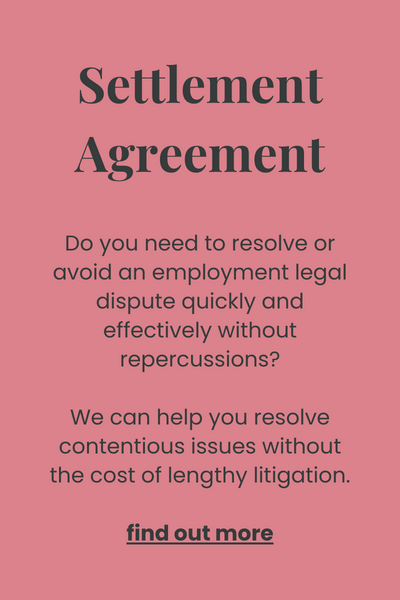Is Your Business Thinking About Dismissing a Senior Manager?

News of the Director-General of the CBI being dismissed because his conduct ‘fell short of that expected’ attracted much attention.
If it caught your eye and got you thinking about the future of a senior manager in your business, here are a few of the things you will want to consider:
Is there an ‘easy’ option when dismissing highly profiled employees?
Sometimes issues come to light early on in someone’s employment – even at a senior level. Whilst that can be frustrating, if your senior manager has short service (under two years’ service) this can work in your favour as a ‘loop-hole’ may mean that it’s possible to dismiss the easy way without the need to follow the usual procedures referred to below.
That said, there are claims that can be brought from day one and no-one wants to find themselves unexpectedly falling foul of the law. So, get in touch to go through our specially devised checklist and secure the case specific advice you need to make informed decisions for your business.
Set your standards and expectations through tailored policies, recognising your business ethos.Click HereApproach poor performance with target driven processes to achieve a desirable outcome for your business.Click HereManage requests for reduced hours or hybrid working, in line with what works best for you.Click Here
Previous slide
Next slide
How does the situation I am facing fit in with the law?
As you may already know, there are five potentially fair reasons for dismissal – conduct, capability (including poor performance), redundancy, statutory illegality and some other substantial reason (SOSR).
Make sure you can identify which of these your situation would come under, in most cases this is fairly straightforward e.g., harassment would normally be a conduct issue. Struggling to work out where your situation would fit in? Make sure it’s not because you are considering dismissing for what in law is a prohibited (automatically unfair) reason, such as in relation to pregnancy, family leave or whistleblowing.
Having a potentially fair reason for a dismissal is a good start, but if your aim is to achieve a safe dismissal this alone won’t be enough. You’ll also need to make sure that the dismissal is fair and usually, that you have correctly followed the applicable process in getting there.
Am I realistically likely to be able to achieve a safe dismissal?
The answer to this will depend on the individual facts and circumstances of the case – sounds like a ‘lawyer-ish’ answer we know, but it is true nonetheless. Should your senior manager challenge their dismissal as being unfair an employment tribunal will be looking at the fairness of the particular case.
That isn’t to say that thinking about the question in general terms is unhelpful as being realistic can help to save you time and effort, possibly avoid making a mistake or even assist you to decide on an alternative route that you feel would work better for your business.
Here’s a few things that you may wish to bear in mind:
- Conduct issue – if the senior manager isn’t subject to any live warnings and you want to dismiss you are probably looking at it being for gross misconduct – so is the issue genuinely one of gross misconduct? Even if it is, don’t assume dismissal will be automatically fair.
- Bear in mind that an employment tribunal will consider matters such as whether the employer believes the employee to be guilty of the allegation(s), whether the employer has reasonable grounds for believing that the employee is guilty, at the time of the belief had the employer carried out as much investigation as was reasonable? What is allowed for in the contract of employment? A decision to dismiss also has to be “within the band of reasonable responses.”
- Poor performance – even in the case of a senior manager it’s important to bear in mind that dismissal for poor performance without previous warnings is unlikely to be fair. Rather, you are usually looking at a performance management process which normally involves setting realistic and achievable targets, allowing time for improvement and providing support. You should also consider whether there is a good reason for your senior manager’s poor performance which may inform your actions, for example do they have a disability and if so, are reasonable adjustments required.
There can be a lot to think about when it comes to the possible dismissal of an employee at any level in your business, but the stakes can be higher when it comes to more senior employees. This makes it vital that you get the business focussed support you need. Get in touch to discuss the specific situation your business is facing and find out about your options for dealing with it.
Navigate the complexities of Employment Law with our commercial advice.Click HereBuild a bespoke interactive course for your management team, covering key HR areas.Click HereAvoid unnecessary wastage of management time with our professional help when defending tribunal claims.Click Here
Previous slide
Next slide
What about procedural steps?
Before dismissing a senior manager, you will usually need to follow a process, if you don’t this can affect the fairness of the dismissal and, depending on the matter you are dealing with, it could cost you more if you were to lose an employment tribunal claim. For example, an unreasonable failure to follow the ACAS Code of Practice on Disciplinaries and Grievances when dealing with a conduct or poor performance issue can give rise to an uplift of up to 25% on the compensatory award if the employee is found to have been unfairly dismissed.
As you would expect, what procedural steps should be followed will depend on why you are looking to dismiss – as you are probably already aware, a redundancy process requires different action to a conduct issue. Want to know more about the particular process to be followed in your situation? Get in touch.
If you are considering skipping a process or taking a ‘short-cut’, whatever the reason it’s vital you have the information you need to make an informed decision before acting so you are aware of the implications for your business. Reach out to discuss the individual facts of the case and explore options for your business.
Could a settlement agreement be what my business needs?
Settlement agreements can be a helpful commercial route for businesses which are looking to exit an employee. It’s likely you will have heard of them, common scenarios where a business might want to think about whether a settlement agreement could be a good option include where a business is finding a formal process such as performance management too slow, too involved or too time-consuming, where you wish to end an employment relationship but it’s unlikely a fair dismissal could be achieved or where you are dealing with a difficult employee or issue and there is a risk of a claim.
Want to know more? Reach out – we have a Specialist Settlement Agreement Service for Employers link here.
If you think you may wish to use a settlement agreement in your business please get in touch for further information and advice on your situation before taking any action, including raising the matter with the employee.


Bespoke Contracts of Employment for ultra protectionClick HereAbsence Management Support for sensitive situationsClick HereHas an employee’s recent behaviour warranted disciplinary action?Click Here
Previous slide
Next slide
Receive Legal Updates
Subscribe To Our Weekly Newsletter
Notifications about changes in Employment Law Legislation, HR News, and service offers.
Read our privacy policy